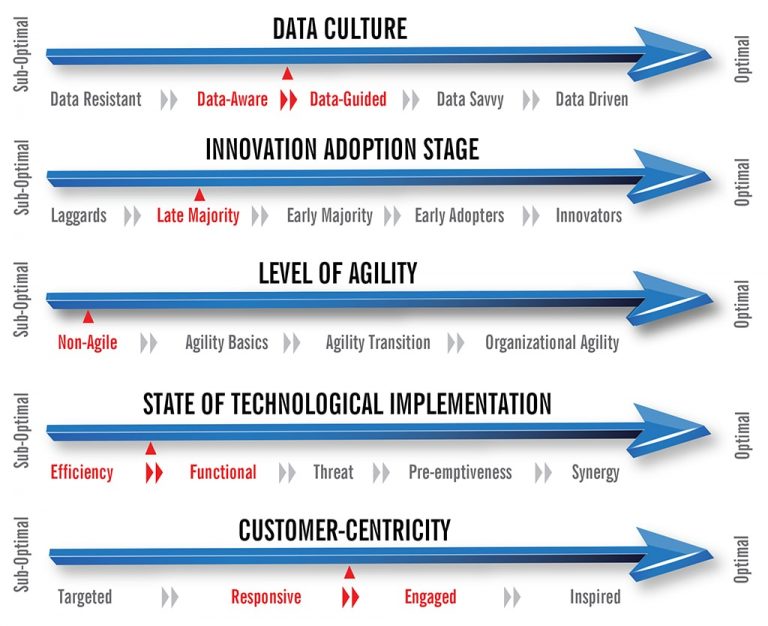
Are Hotels Ready for a Digital Transformation?
The International Journal of Hospitality Management recently published a study undertaken by Carmen Lam and Rob Law of the Hong Kong Polytechnic University regarding the readiness of “upscale” through “luxury” hotels for innovation, the adoption of a data-driven culture, digital transformation, and customer-centrism in order to effectively compete and win in today’s and tomorrow’s environment.
Hotels have to meet the expectations of consumers and at the same time grow share of market and grow profitability. In addition, hotels now must be prepared to not only compete with other hotels but, in addition: online travel agents (OTAs) that own channel share and have caused distribution costs to rise at the same time, previously non-competing platforms such as TripAdvisor and Google have expanded their business models to join the competition and lastly, the disruptive influence of the sharing economy with Airbnb, HomeAway and OneFineStay are also competing for occupancy share. Co-working has also influenced changes in the business and meetings segments. Many individuals attribute this to changes in customer expectations and the low barriers to innovation.
It’s apparent that this equates to increased distribution costs, reduced satisfaction, diminished customer loyalty and the reduction in value of hotel brands.
In a 2016 Forbes article, hotel industry leaders discussed the customer expectations in a connected society and agreed that the travel and hospitality industries must leverage digital connectivity, and develop a deeper customer understanding to develop fulfilling and appropriate customer experiences. Hotels need to enable the right technologies, maximize their data assets, and increase customer knowledge to attain increased customer satisfaction, loyalty and use.
Customer expectations:
They expect to receive relevant marketing messages based on their profile data, purchase history, and stage in customer life cycle.
They trust user-generated content, such as travel reviews and friends’ comments, more than paid media of hotels.
They expect to find information and validation on social channels.
They expect personal recognition, unique experiences, and one-to-one relationships with their favorite brands at all touchpoints
They expect fast and easy access to information, special rates and offers anytime and anywhere that is convenient to them
They expect consistent experiences across different channels.
They will use the channel that is most convenient and effective for them.
They expect to access information easily and seamlessly when using multiple devices.
They expect customer service to be localized for them (e.g., language, time zones and accessibility).
This means that to succeed and thrive in the new competitive environment, hotel companies need to undertake a digital transformation which leverages digital technologies and requires the transformation of the entire organization to remain relevant and competitive in the marketplace.
Studies have identified that successful digital transformation requires not just technology but also aligning strategies and other factors, such as people, culture, mindset, talent development, and leadership. It has been stated that the key to digital transformation was to focus on the transformation aspect rather than the digital aspect, requiring organizational flexibility in systems, processes, structure, setup and people with the right mindset and culture. These studies have shown that critical aspects for organizations to achieve digital transformation are collaborative culture and behavior, data-driven practices, team members with innovative mindsets and customer-first focus. Facing intense competition for channel and market share, hoteliers need to transform their business operations to adapt to the new environment of multi-device mobile Internet connectivity and provide personalized customer experiences to exceed expectations and regain customer loyalty.
For example: the digital transformation of brand-affiliated hotels is a complex subject that requires the complementary efforts of three levels of players:
- Brand or Corporate HQ
- Hotel management
- The individual players
However, while Brand HQ is expected to possess the knowledge, expertise and leadership to guide hotels to meet these challenges, the Sales & Marketing team at the hotel level is the critical link in the customer relationship value chain providing the connection between the digital, behavioral, attitudinal and physical aspects of the customer journey.
Success in this area requires the property-level Sales & Marketing teams to be empowered by Brand HQ and therefore accountable, to know their role in delivering to customer expectations, and to possess the leadership to execute customer experience improvements for customer-centric marketing.
The objective of the study undertaken by Lam and Law was to draw conclusions as to whether Sales & Marketing teams in upscale through luxury hotels are ready to compete for their customer and channel share by assessing the key competencies required. The approach was qualitative and descriptive in order to solicit as much data as possible on mindset, systems, processes and the organizational situation.
The results reveal that both IT and Sales & Marketing groups in the sample set had little knowledge on the systems required and of each other’s challenges. There was apparently little communication between the two groups.
The IT cohort poorly understood the role of Sales & Marketing group, the automation needs or the data requirements. The IT group’s focus was on making installed tech work not on the desired outcomes and deliverables.
Sales & Marketing: preoccupied with short term tangible deliverables. Acknowledged the importance of the digital transformation, they did not know how to truly maximize the volumes of data at their disposal and could not define the initiatives that needed to be accomplished.
To gain insight into the key factors behind the situation, the findings were summarized according to state of technology implementation, innovation, data culture, customer centricity and working culture:
Data Culture: Hotels were data-aware and somewhat data-guided but not data-savvy
Innovation adoption stage: Hotels were a late majority.
Level of agility: Hotels were at a non-agile stage that represented their working culture.
Hotels’ stage of technology implementation: the efficiency/ functional level.
Degree of customer-centricity: Hotels were between being responsive and being engaged with their customers.

The findings indicated that the Sales & Marketing teams in branded upscale/luxury hotels in the sample group were not ready for the digital era not just technologically; but, also in terms of their processes, people, culture, and mindset. Due to this lack of readiness of the hotels, Corporate or Brand HQ offiice must take the lead to create and implement plans to produce change in mindset, skills, systems, and processes at the property level. This was a sobering study that once again supports the need for a shift in data utilization throughout the hotel, management companies and Brand HQ.
International Journal of Hospitality Management © 2018 Elsevier Ltd. All rights reserved
Carmen Lam, Rob Law
School of Hotel and Tourism Management, The Hong Kong Polytechnic University, Hong Kong
